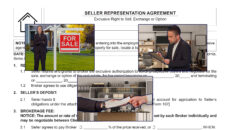The real estate business is about relationships — it’s a people business.
Like other professionals, a real estate agent hones their skills and authority through education, training, experience and attitude. Your professional opinions and knowledge are the most valuable asset you bring to a client relationship. Thus, you best serve your clients, and yourself, by maintaining a high degree of control in the client relationship.
However, all agents have experienced an unproductive client relationship which is one-sided, driven by an overbearing client.
Client dominance often interferes with obligatory due diligence efforts, disclosures and best practices, while inducing agent resentment for not wanting to jeopardize their expectation of a fee.
At some point, when you find yourself in this no-win situation, you need to consider how to tactfully sever the relationship before damage is done and further time is expended without benefit.
Here are five types of clients to be vigilant about:
1.The know-it-all
The know-it-all client tends to correct you, ask the same question repeatedly, and quote the nonprofessional advice they’ve received from a friend or relative who just bought a home or took out a mortgage. These clients believe they know more than you do about real estate pricing, market conditions and what needs to be done to close a deal.
Often, these clients are first-timers who have never bought or sold real estate, or it has been several years and a business cycle since they’ve been involved in real estate. They firmly hold on to anecdotal information and illusions from past markets, and no amount of evidence to the contrary will alter their thinking.
Identify these clients early. Educate them on the present state of the market when soliciting employment to act on their behalf to buy or sell, lease or mortgage real estate. Gather market data on their needs. Demonstrate with data and information — hard evidence — that you are an expert.
If they don’t get it in terms of who knows best to control the activity needed to get a finalize a deal, let them seek out another agent. Save yourself the frustration and wasted time they will cause you as your client.
2. The low-baller
Buyers and so-called “investors” are sometimes focused on stealing property. Typically, they are either ignorant of market conditions or in it for an immediate flip. This type of client insists on making “low-ball,” below-market offers on numerous properties. The frustration comes when all of their offers are rejected or countered, and they still refuse to budge on their price expectations.
When a client is not interested in paying a reasonable, comparable market price to acquire real estate, you will end up showing them property week after week. Offers will be prepared and submitted, but none will be accepted. Here, the client not only consumes your valuable time and squanders your talent, they drive you to professional conduct likely to stigmatize you with other agents as one known to present offers at prices unsupported by market activity.
Set a time limit for working with these clients when you realize their objectives do not allow them to participate in the market in a meaningful way. Decide when enough is enough, then fire them. Time is a valuable asset.
3. The time-waster
Time wasters are clients notorious for keeping you at their beck and call. They insist on you showing property at their convenience, not a time mutually agreeable.
A time-waster is the type of client who expects you to drop everything and meet them anytime they drive by a house with a for-sale sign on it. If you cannot meet them, they threaten to call the seller’s agent and deal with them directly, undermining your ability to best represent their interests.
Then, once you’ve dropped everything else underway to run and show them the property, these clients never seem to like what you’ve shown them. And the cycle continues, resulting in a huge output of your time, talent and money — and no closed deal or fees to show for it.
If you allow time-wasters to dominate your schedule, you miss out on opportunities to represent other clients who earnestly want to acquire property, or worse, deplete your personal and family time. Thus, to generate sufficient income to maintain the standard of living you are capable of, you end up spending more time working for naught.
At the heart of the issue is a lack of agent control. Avoid falling into a time-waster’s trap by setting the tone for the client relationship upfront. Sit down in a face-to-face meeting with the client to discuss the written employment agreement, buyer-client expectations and market conditions. Establishing the pattern of your work ethic with your clients upfront prevents them from overstepping client boundaries and interfering unreasonably with your practice. [See RPI Form 103]
An occasional shift in your schedule to accommodate a ready, willing and able client is part of conducting business. However, when this activity lingers on without producing a transaction with the same individual, consider dropping them.
Very few clients are worthy of setting your schedule for you. Set scheduling standards and keep your personal time intact. Cancelling “you” time for time demanded by clients rarely pays dividends. There are just costs with no corresponding benefits.
4. The overpriced seller
There are two distinct types of overpriced sellers:
- motivated sellers who start off seeking a high price but eventually come down to a realistic price out of their need to sell, also called necessitous sellers; and
- unmotivated sellers that will only sell if they can do so at their inflated illusionary price — a score in the marketplace sought based on the rare occurrence an offer from a totally emotional and equally unrealistic buyer will be submitted.
Stay away from the latter. The first warning sign that you’re dealing with an overpriced seller is when they say, “I will only sell if I can get my price.” Consider this a red behavioral flag.
These sellers are deliberately overreaching, using you to do all the work to test for the existence of their “money illusion” about their property’s value. They are not persuaded by a price analysis presented by you as evidence of a reasonable asking price that will attract buyers and be in escrow within 30 to 60 days.
Many agents argue that even a listing from an overpriced seller can generate other referral business and become profitable in the long run.
This is unlikely. In most cases, this strategy is counter-productive. An unsellable listing actually costs more than most agents think. In addition to the out-of-pocket money costs of signage, advertising and vehicle operations, consider the cost of having your name on a property that does not sell, becomes known as shop worn, and produces continuous calls from the seller asking why you haven’t located any buyers or shown their property. Further, other potential sellers in the area will not hire you if you cannot sell their neighbor’s house. Simply, this tarnishes you reputation and your brand.
The financial and physical stress of having an overpriced and unmarketable listing far outweighs any benefit of taking the listing.
When meeting with a potential seller, first prequalify them to determine what motivates them to put the property on the market. Ask questions about their relocation on closing the sale, and find out where, when and why.
Part of this inquiry includes gathering information for a profile of your client. To build a profile requires an inquiry into the client’s background. In turn, the respectful client will perceive you are interested in them and you will gain a better understanding of your client’s needs, an imperative to keeping control. [See RPI Form 350]
By prequalifying the prospective client, you establish control before being retained. If you determine they lack motivation to sell, reject the listing and move on.
5. The liar
Occasionally, the most egregious of clients falls into this category. Their deceptive antics always lead to disputes. Disputes of this nature sometimes blow up into legal and DRE disciplinary actions over whether the agent was aware of the deceit involved.
Avoid this type of client at all costs.
Consider a seller who questions whether a material fact about the condition of the property needs to be disclosed. Often, this is a legitimate question for a novice real estate seller to ask an agent. However, be wary of a seller who is looking for a way out of disclosing a defect they know will negatively impact their chances of receiving their desired price.
It is difficult to control a dishonest seller since you do not know when they are lying. They tend to keep defects — material facts — from you as their agent. Just as they are reluctant to disclose a defect to a potential buyer, they are also reluctant to disclose the known defect to you.
Typically, they figure that if they can get discovery of defects past you and you fail to observe the defect, the buyer and the buyer’s agent also will not likely observe the defects. Here, the seller tries their deceit out on you first to see what happens.
However, when the seller comes out and says they do not want a material fact disclosed since it will make the home more difficult to sell, you need to educate them on why that is an unacceptable approach to selling real estate. If not convinced thoroughly that the seller fully understands the deceit involved and the risks imposed on you as their agent, do not take the listing.
Related Video: Property is Sold “As-Disclosed,” Never “As-Is”
Click here for more information on this topic.
Hiding material facts and defects from buyers and their agents always comes back to haunt you. When the risk of liability exists, and the seller will not properly disclose, let them go immediately — no matter how lucrative the transaction might become. It is easier to walk away than to defend yourself and your license.
To walk is the professional thing to do.
Take control
Educate your clients. Let them know how you operate. Then stick to your standards. If you are upfront with your clients, they will be more respectful of your time and expertise, allowing you to maintain the necessary control throughout the transaction.
Pay attention to what they are really saying. Read between the lines and keep their motivation in mind.
However, not every behavior is a cause for concern. Their intent may not be to deceive others or have objectives that will waste your time. They may be legitimately looking for a way to maximize their profits from a sale or purchase the best property at the best price.
It’s up to you to let them know how to best attain these goals efficiently without creating disputes.
Finally, after entering into a client relationship, make a decision when frustration sets in. Will you continue to work with them, or do you need to let them go? This decision may be trying for you, especially if you have already invested time working for them locating buyers, tenants or showing them properties.
Set your limits. When your client has crossed over the line, reassess the situation and decide if you need to let them go. Conserve your time and energy for motivated clients. Remember, lost time can never be recovered.
This article was originally posted May, 2015 of Brokerage Reminder: Agents beware – 5 signs of a difficult client, and has been updated.















Think about a seller who wonders whether a crucial detail regarding the property’s state ought to be mentioned. This is frequently a reasonable query for a new seller to pose to the agency.